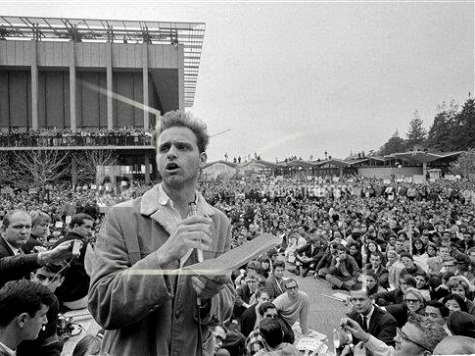Tuesday, December 2, is the 50th anniversary of the Free Speech Movement at the University of California, Berkeley. In 1964, on December 2, a simmering dispute between campus activists and the UC-Berkeley administration boiled over as over 1,000 took over the administration building with a sit-in. The next day, 814 people were arrested.
The dispute had lasted for months: at that time, political activities that revolved around causes outside the university campus were prohibited at all UC campuses. The activists defied the ban, setting up tables with leaflets to raise funds on a walkway at the UC Berkeley Telegraph Avenue entrance. In response, the dean of students told student organizations they could not use the walkway “to support or advocate off-campus political or social action.”
As the Associated Press notes, in September, students from the university protested for civil rights at Bay Area businesses and at the Republican National Convention in San Francisco. On Oct. 1, police attempted an arrest of a former student staffing a table for the Congress on Racial Equality. They were prevented from arresting him by hundreds of students, who blocked the police car from leaving. 32 hours later, UC President Clark Kerr stated he would not press charges against the students, and agreed to set up meetings to make amendments on student speech issues. It didn’t work.
Kerr was a great force in university education; as David Ward, president of the American Council on Education and former chancellor of the University of Wisconsin at Madison, said, “Every student and every campus leader alive today owes Clark Kerr a great debt of gratitude–for it was his vision and his bold determination that helped create the modern university, and the idea that students from all walks of life should have access to college.”
Kerr himself said: “I stood for diversity within the University of California. Rather than having one or two enormous campuses, we should have several campuses distributed around the state of reasonable size, serving the major communities of the state. Each one should be different–have its own personality, its own special character, its own sense of identity.”
On December 2, 1964, Mario Savio, a 21-year-old philosophy major, exhorted the students, “There’s a time when the operation of the machine becomes so odious, makes you so sick at heart that you can’t take part. And you’ve got to put your bodies upon the gears and upon the wheels, upon the levers, upon all the apparatus, and you’ve got to make it stop!” Joan Baez, 23, sang “We Shall Overcome.” Jackie Goldberg, later one of the first lesbians to serve in the California Legislature, also led the activists.
In November, Berkeley students, ever eager to resurrect the 1960’s, used a less altruistic vehicle for protesting; they occupied a campus classroom building for a week to demonstrate against tuition hikes. On Tuesday, the students have plans to read letters from students who were arrested 50 years ago.
At a campus reunion this fall, Goldberg pontificated, “Every morning, get up and look in the mirror as you are brushing those dentures and say to yourself, ‘I will not be cynical today. I will not believe the crap that everyone is in it for themselves. I will not believe that everyone is corrupt. I will not believe the propaganda that tells me it is all hopeless. It is never hopeless.'”

COMMENTS
Please let us know if you're having issues with commenting.